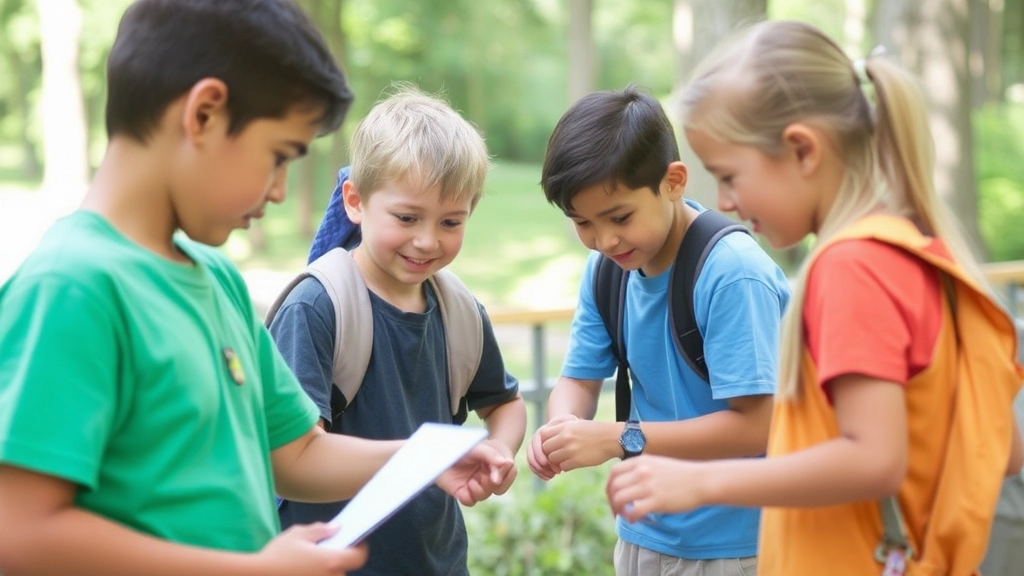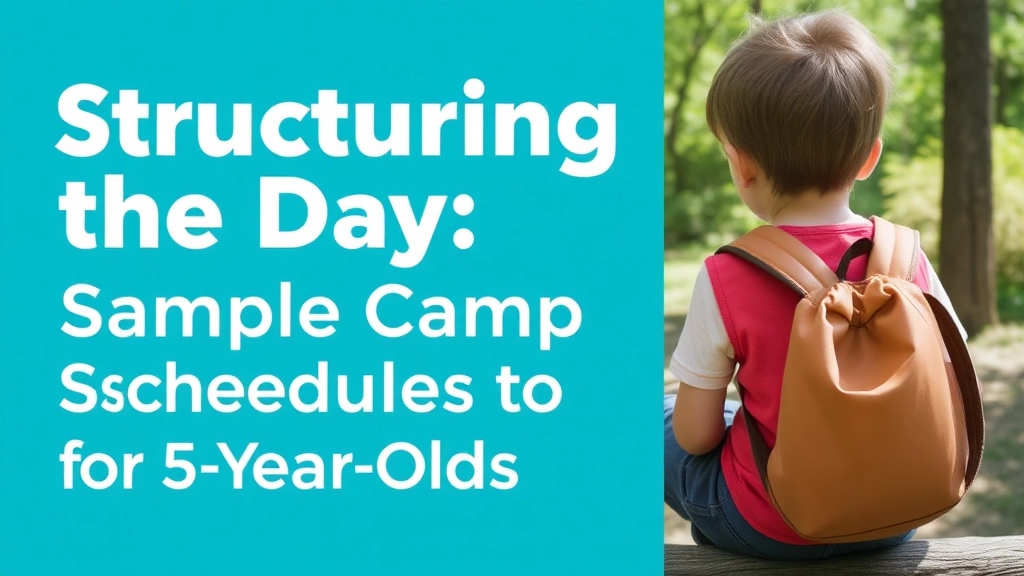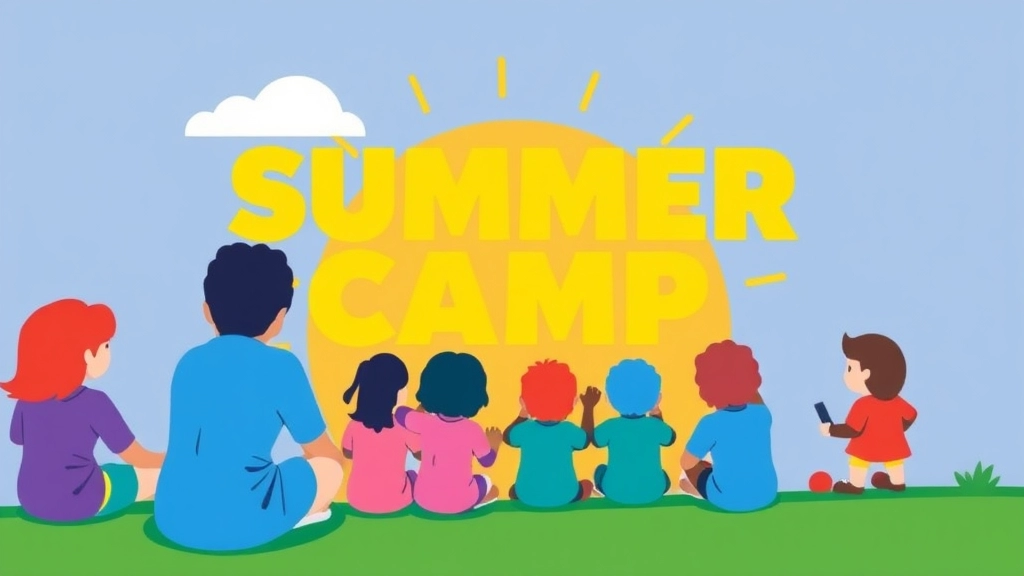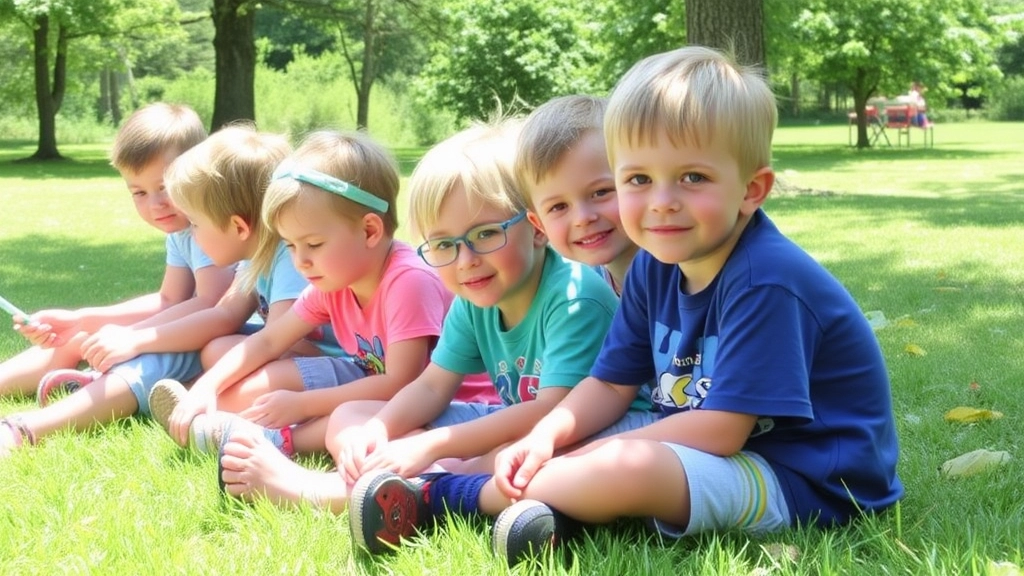Summer Camp for 5-Year-Olds
Are you contemplating whether a summer camp for 5-year-olds is the right choice for your child? You’re not alone. Many parents face this dilemma, wondering if their little ones are ready for such an adventure. This article dives deep into the myriad benefits of summer camps, from fostering independence and social skills to providing a structured day filled with fun activities and emotional growth opportunities.
Benefits of Summer Camp for 5-Year-Olds
Why Consider Summer Camp for Your Little One?
Ever wondered if sending your 5-year-old to summer camp is a good idea? You’re not alone. Many parents worry about whether their child is ready for the experience. But here’s the deal: summer camp can be a game-changer for young kids. Let’s dive into why.
Building Independence
At camp, kids learn to do things on their own. It’s a safe environment where they can try new activities without mum or dad hovering. This newfound independence boosts their confidence and helps them grow. For more insights, check out our guide on summer camp counselor duties and responsibilities.
Making Friends and Social Skills
Summer camp is a social hub. Your child will meet other kids, learn to share, and play cooperatively. It’s like a crash course in making friends and getting along with others. Discover the culture and activities that foster these connections.
Physical Activity Galore
Worried about screen time? Camps are packed with physical activities. From swimming to mini sports, your child will be moving and grooving all day. This helps with their physical development and keeps them healthy.
Creative Exploration
Camps often offer arts and crafts, music, and drama. These activities spark creativity and let your child express themselves in new ways. Who knows, you might discover a hidden talent!
Routine and Structure
Kids thrive on routine, and camps provide a structured day. This helps them feel secure and understand the flow of time. Plus, it makes transitioning back to school a breeze.
Emotional Growth
Being away from home, even for a few hours, teaches kids resilience. They learn to manage emotions and solve small problems on their own. It’s all about growing up, one step at a time.
Real Stories from Parents
I remember chatting with a friend who was hesitant about sending her daughter to camp. After just a week, she noticed her little one was more outgoing and eager to try new things. It’s these real-life transformations that make summer camp so worthwhile.
Key Factors to Consider When Choosing a Summer Camp

Choosing a summer camp for your 5-year-old can feel overwhelming.
What if they don’t enjoy it?
What if it’s not safe?
Let’s break it down and make it simple.
Safety First
You want peace of mind.
Look for camps with a solid safety record.
Ask about:
- Staff-to-child ratios: More staff means more eyes on your child.
- First-aid training: Are staff trained and certified?
- Emergency procedures: Do they have a clear plan?
Location, Location, Location
Convenience matters.
Is the camp close to home or work?
A shorter drive means less stress for you and your child.
Activities Offered
You want your child engaged and having fun.
Check if they offer a variety:
- Arts and crafts
- Sports and games
- Nature exploration
Staff Experience
Experienced staff can make a huge difference.
Ask about their backgrounds.
Do they have experience with young children?
Camp Philosophy
What’s the camp’s mission?
Are they focused on learning, fun, or both?
Make sure it aligns with your values.
Cost and Value
Summer camps can be pricey, but they don’t have to break the bank.
Look for:
- Early bird discounts
- Sibling discounts
- Scholarship opportunities
Testimonials and Reviews
Word of mouth is powerful.
Talk to other parents.
Read online reviews.
Get the inside scoop.
Trial Days
Some camps offer trial days.
This can be a great way to see if it’s the right fit without committing.
Choosing a summer camp doesn’t have to be stressful.
Focus on these key factors, and you’ll be on your way to finding the perfect spot for your little one.
Popular Activities for 5-Year-Olds at Summer Camps
Alright, let’s dive straight into it. You’re probably wondering, “What kind of activities will keep my 5-year-old engaged and happy at summer camp?” Great question. Let’s break it down.
Why Activities Matter
First off, activities are the backbone of any good summer camp. They keep the kids entertained, teach them new skills, and help them make friends. For 5-year-olds, the key is to balance fun with learning, all while ensuring they’re safe and supervised.
Classic Outdoor Fun
Outdoor activities are a staple. Think back to your own childhoodârunning around, playing games, and just being outside. Here are some of the hits:
- Nature Walks: Simple, but effective. Kids love exploring and discovering new things. Plus, it’s a sneaky way to teach them about the environment.
- Water Play: Whether it’s a splash pad, a small pool, or water balloons, kids can’t get enough of water activities.
- Sports and Games: Tag, relay races, and simple sports like football or catch are always winners. They help develop motor skills and teamwork.
Creative Arts and Crafts
Let’s face it, 5-year-olds have wild imaginations. Arts and crafts let them express that creativity. Here are some popular options:
- Painting and Drawing: Give them some paints or crayons, and watch their creativity flow. It’s also a great way to develop fine motor skills.
- Building Projects: Think LEGO or simple woodworking. It’s all about creating something from scratch.
- Themed Crafts: Whether it’s making masks for a jungle-themed week or constructing pirate hats, themed crafts are a hit.
Music and Movement
Kids love to move, and they love music. Combine the two, and you’ve got a recipe for fun. Here are some ideas:
- Dance Parties: Play some upbeat music and let the kids dance their hearts out. It’s great exercise and loads of fun.
- Musical Instruments: Simple instruments like tambourines, maracas, or even pots and pans can turn into an impromptu band.
- Sing-Alongs: Classic campfire songs or popular kids’ tunes are perfect for group sing-alongs.
Story Time and Drama
Never underestimate the power of a good story. Here’s how you can incorporate storytelling and drama:
- Story Time: Reading books or telling stories can captivate young minds. It’s also a nice way to wind down after more active play.
- Puppet Shows: Kids love watching puppet shows, and they love putting on their own even more.
- Dress-Up and Role-Playing: Give them costumes and let their imaginations run wild. They can be anything from superheroes to animals.
Science and Discovery
Even at five, kids are curious about the world. Science activities can be both educational and fun:
- Simple Experiments: Think baking soda and vinegar volcanoes or making slime. These activities are hands-on and fascinating.
- Nature Exploration: Collecting leaves, rocks, or bugs can turn into a mini science lesson.
- Interactive Learning: Things like building simple circuits or learning about magnets can be both fun and educational.
Indoor Games and Puzzles
Sometimes, you need a break from the sun. Indoor activities can be just as engaging:
Safety and Supervision Guidelines at Camps

Ever wondered if your 5-year-old will be safe at summer camp?
Yeah, me too.
Safety and supervision are top priorities when sending your little one off to camp.
Let’s dive into what you need to know.
Why Safety Matters
First off, no one wants to worry about their kid while they’re supposed to be having fun.
You want peace of mind.
So, what should you look for?
Staff Credentials
- Qualified Staff: Make sure the camp hires staff who are trained in first aid and CPR.
- Background Checks: Camps should run background checks on all employees.
- Low Staff-to-Child Ratio: Ideally, there should be one staff member for every 5-6 kids.
Facility Safety
- Secure Environment: Check if the camp has secure boundaries to keep kids from wandering off.
- Cleanliness: The camp should be clean and well-maintained.
- Emergency Plans: Ask if they have an emergency plan for situations like fires or severe weather.
Daily Supervision
- Constant Monitoring: Kids should be supervised at all times, no exceptions.
- Activity Supervision: Whether it’s swimming or hiking, there should always be a trained adult present.
- Check-In and Check-Out Procedures: Camps should have strict procedures for dropping off and picking up kids.
Real Talk: A Personal Story
I remember when my cousin sent her 5-year-old to camp for the first time.
She was a nervous wreck.
But the camp staff were pros.
They had walkie-talkies, frequent headcounts, and even a buddy system to make sure no one got lost.
By the end of the week, my cousin was so relieved and her kid had the time of his life.
What You Can Do
- Visit the Camp: Take a tour before you commit.
- Ask Questions: Don’t be shy. Ask about their safety protocols.
- Trust Your Gut: If something feels off, it probably is.
Social and Emotional Growth Opportunities at Camp
Worried about your 5-year-old’s social and emotional development? You’re not alone. Many parents wonder if their little ones are ready for the big leap into summer camp. The truth is, summer camp can be a goldmine for social and emotional growth.
Why Social and Emotional Growth Matters
At this age, kids are like sponges, soaking up experiences that shape their personalities. Summer camp provides a unique environment where they can:
- Build Friendships: Camps are a melting pot of kids from different backgrounds. Your child will learn to make friends, share, and cooperate.
- Boost Confidence: Trying new activities and mastering them can skyrocket a child’s self-esteem.
- Develop Independence: Being away from home, even for a few hours, teaches kids to rely on themselves and make decisions.
Real Stories from the Campfire
Take little Emma, for instance. She was shy and hesitant to join group activities. But after just a week at camp, she was leading a group sing-along. Her parents couldn’t believe the transformation. It’s amazing what a supportive environment can do.
What to Look for in a Camp
Choosing the right camp is crucial for fostering social and emotional growth. Here are some must-haves:
- Qualified Staff: Look for camps with experienced counsellors trained in child development.
- Structured Activities: Camps should offer a mix of solo and group activities to balance independence and teamwork.
- Open Communication: A good camp will keep you in the loop about your child’s progress and any issues that arise.
Sample Activities that Promote Growth
- Team Sports: Great for learning cooperation and teamwork.
- Arts and Crafts: Encourages creativity and self-expression.
- Story Time: Helps develop listening skills and empathy.
For more tips on choosing the perfect camp, check out our guide to summer camp fairs. If you’re looking for specialized camps, our article on the top LGBT summer camps for 2024 offers great options.
Structuring the Day: Sample Camp Schedules for 5-Year-Olds

Ever wondered what a day at summer camp looks like for a 5-year-old?
I get it.
You want to make sure your little one is having fun, learning, and staying safe.
So, let’s break it down.
Morning Routine
7:30 AM – 8:30 AM: Drop-Off and Free Play
- Kids start arriving.
- They get some free play time to settle in.
- Think of it as a warm-up for the day.
8:30 AM – 9:00 AM: Morning Circle Time
- Campers gather in a circle.
- They sing songs, hear stories, and get a rundown of the day’s activities.
- This helps them feel part of the group.
Mid-Morning Activities
9:00 AM – 10:00 AM: Arts and Crafts
- Time to get creative.
- Activities like painting, drawing, and simple crafts.
- Great for developing fine motor skills.
10:00 AM – 10:15 AM: Snack Break
- Healthy snacks to refuel.
- Kids get a chance to chat and relax.
10:15 AM – 11:15 AM: Outdoor Play
- Think playground time, nature walks, or simple sports.
- Fresh air and physical activity are key.
Late Morning
11:15 AM – 12:00 PM: Educational Activities
- Fun learning sessions.
- Could be science experiments, storytime, or basic math games.
- Keeps their brains engaged.
Lunch and Rest
12:00 PM – 1:00 PM: Lunch Time
- Packed lunches from home or provided by the camp.
- A chance to socialise and recharge.
1:00 PM – 1:30 PM: Quiet Time
- Naptime or quiet activities like reading.
- Helps them rest and get ready for the afternoon.
Afternoon Fun
1:30 PM – 2:30 PM: Themed Activities
- Could be anything from pirate adventures to space exploration.
- Keeps the excitement high and the imagination flowing.
2:30 PM – 3:00 PM: Music and Movement
- Dancing, singing, and simple musical games.
- Perfect for burning off some energy.
Wrapping Up the Day
3:00 PM – 3:30 PM: Snack and Story Time
- Another snack break.
- Followed by a group story to wind down.
3:30 PM – 4:00 PM: Pick-Up Time
- Parents arrive to pick up their happy, tired kids.
- Camp staff give a quick rundown of the day’s highlights.
Why This Structure Works
- Consistency: Kids thrive on routine.
- Variety: Keeps them engaged and excited.
- Balance: Mix of physical, creative, and educational activities.
Real Talk
It’s all about balance.
You want your 5-year-old to have a blast, learn a bit, and come home with great stories.
This schedule does just that.
Got questions or stories about your own camp experiences?
Drop them below.
Let’s keep this convo going.
And remember, structuring the day right makes all the difference.
So, what’s your take on this sample schedule?
Finding the Perfect Camp
Looking for more tips on choosing the right camp?
Check out our guide on Key Factors to Consider When Choosing a Summer Camp.
Your kid’s perfect summer is just a click away.
Special Events and Themed Weeks for Added Fun
Hey, parents! Ever worried that your 5-year-old might get bored at summer camp? Trust me, I get it. Keeping those little ones engaged is no small feat. But here’s the good news: summer camps are stepping up their game with special events and themed weeks. It’s not just about fun; it’s about making memories that stick.
Why Special Events and Themed Weeks?
Think about it. Kids love variety. Imagine your child waking up excited because it’s Superhero Week or Pirate Adventure Day. These themes aren’t just for fun; they’re carefully designed to:
- Boost creativity: Dressing up as their favourite characters.
- Encourage participation: Everyone gets involved.
- Enhance learning: Activities tied to the theme make learning sneaky fun.
Types of Themed Weeks
Here’s a quick rundown of popular themed weeks that camps often offer:
- Superhero Week: Capes, masks, and saving the day.
- Under the Sea: Marine crafts, water games, and learning about sea creatures.
- Space Exploration: Rocket building, star gazing, and alien hunts.
- Animal Kingdom: Safari adventures, animal crafts, and nature walks.
- Pirate Week: Treasure hunts, pirate costumes, and map reading.
Special Events That Kids Love
Beyond themed weeks, camps also throw in special events to keep things fresh:
- Talent Shows: Let your child shine, whether it’s singing, dancing, or telling jokes.
- Carnival Day: Games, face painting, and cotton candy. Need I say more?
- Water Play Days: Think water slides, splash pads, and water balloon fights.
- Field Trips: Safe, supervised trips to local zoos, parks, or museums.
Real Stories, Real Fun
I remember a mum telling me about her son, Jack. He was shy and hesitant about camp. But during Superhero Week, he donned a cape and transformed. By the end of the week, he was leading the pack in games and activities. That’s the power of themed weeks and special events.
Making It Work for You
Worried about how to find camps with these features? Look for:
- Camp brochures: They often list special events and themes.
- Camp websites: Check the activities section.
- Word of mouth: Ask other parents or read reviews.
For more tips on ensuring your child has an unforgettable summer, check out our guide on summer camp week themes and discover how to make the most of summer camp rules and guidelines to keep your child safe and happy.
Making Summer Camp Affordable for Families

Worried about the cost of summer camp?
You’re not alone.
Many parents wonder how they can afford a fun, enriching experience for their kids without breaking the bank.
Good news: there are ways to make summer camp affordable.
Let’s dive in.
Look for Early Bird Discounts
Many camps offer discounts if you sign up early.
- Mark your calendar.
- Check deadlines.
- Save money.
Scholarships and Financial Aid
Did you know some camps offer scholarships?
- Ask about financial aid.
- Fill out the forms.
- Get help with the costs.
Payment Plans
Some camps let you pay in instalments.
- Spread out the cost.
- Manage your budget.
- Make it easier on your wallet.
Community Programs
Local community centres often have affordable camp options.
- Check out the local YMCA.
- Look for council-run programmes.
- Find budget-friendly options.
Sibling Discounts
Got more than one kid? Some camps offer discounts for siblings.
- Ask about family rates.
- Save more with each child.
- Keep everyone happy.
Fundraising
Get creative with fundraising.
- Host a bake sale.
- Organise a car wash.
- Use crowdfunding sites.
Tax Benefits
In the UK, you might be eligible for tax credits or childcare vouchers.
- Look into tax credits.
- Use childcare vouchers.
- Reduce your out-of-pocket costs.
Employer Discounts
Some employers offer discounts for summer camps.
- Check with your HR department.
- See if there are any partnerships.
- Take advantage of workplace perks.
Volunteer for a Discount
Some camps offer reduced rates if you volunteer.
- Offer to help out.
- Save money on fees.
- Be part of the experience.
Compare and Contrast
Don’t settle for the first camp you find.
- Shop around.
- Compare prices.
- Find the best deal.
Consider Day Camps
Day camps are often cheaper than overnight camps.
- Look into day camps.
- Save on accommodation costs.
- Keep your evenings free.
Making summer camp affordable is possible.
With a bit of planning and creativity, you can give your child a memorable summer without emptying your bank account.
Ready to start saving?
Look into these options today and make summer camp a reality for your family.
Preparing Your Child for Their First Summer Camp Experience
Are you worried about how to prepare your child for their first summer camp experience? You’re not alone. Many parents feel a mix of excitement and anxiety when sending their 5-year-olds off to camp for the first time. Let’s break it down and make it simple.
Start with the Basics
First off, talk to your child about what to expect. Kids at this age thrive on routine and knowing what’s coming next. Here’s how you can ease them into the idea:
- Explain the daily schedule: âYou’ll have breakfast, then playtime, then a fun activity like arts and crafts or swimming.â
- Visit the camp beforehand: A quick tour can make a world of difference.
- Read books about camp: Stories can make the concept less intimidating.
Pack Smart
Packing can be a daunting task, but let’s keep it straightforward. Here’s a checklist to ensure you’ve got everything covered:
- Label everything: Clothes, water bottles, even shoes.
- Pack extra clothes: Accidents happen.
- Send comfort items: A favourite stuffed animal or blanket can provide reassurance.
Build Independence
Encourage small acts of independence at home before camp starts. This can be as simple as:
- Letting them dress themselves: Even if the socks don’t match.
- Teaching them to open their own snacks: This boosts confidence.
- Practising bathroom routines: Make sure they know how to manage on their own.
Role-Playing Scenarios
Kids love role-playing, and it’s a great way to prepare them for camp situations. Set up mini-scenes like:
- Meeting a new friend: âHi, I’m [Name]. What’s your name?â
- Asking for help: âCan you help me with this?â
- Following instructions: âWhen the whistle blows, it’s time to come back.â
Stay Positive
Your attitude will set the tone. If you’re excited, they’ll be excited. Share your own positive camp experiences if you have any. Talk about:
- The fun activities: âI loved making new friends and learning to swim.â
- The new skills: âYou’ll learn so many cool things!â
Stay Connected
Ease separation anxiety by staying connected in small ways:
- Send a note: A little love note in their lunchbox can go a long way.
- Talk about the day: When they come home, ask specific questions like, âWhat was the best part of your day?â
Handling First-Day Jitters
Expect some nerves on the first day. That’s normal. Here’s how to handle it:
Finding Local Camps and Convenient Locations
So, you’re on the hunt for the perfect summer camp for your 5-year-old?
I get it.
It’s not just about finding any camp; it’s about finding the right one.
One that’s close enough so you’re not spending half your day driving back and forth, and one that’s got everything your kiddo needs to have a blast.
Why Location Matters
First off, location is key.
You don’t want to be stuck in traffic every morning, right?
And your child shouldn’t have to endure a long car ride either.
Look for camps that are within a 20-30 minute drive from your home.
This way, drop-offs and pick-ups are a breeze.
How to Find Local Camps
But how do you find these local gems?
Here’s a quick guide:
- Google It: A simple search for “summer camps near me” can give you a good starting point.
- Local Community Boards: Check out community centres, libraries, and even coffee shops for flyers and info.
- Social Media Groups: Join local parenting groups on Facebook. These are gold mines for recommendations.
- School Recommendations: Schools often have partnerships with local camps. Ask your child’s teacher or school admin.
Evaluating Convenience
Once you’ve got a list, it’s time to evaluate convenience.
Here’s what to consider:
- Proximity: Is it close to home or work?
- Traffic: What’s the traffic like during drop-off and pick-up times?
- Parking: Is there ample parking space?
- Public Transport: If you rely on public transport, is the camp easily accessible?
Real-Life Example
Last summer, I found a camp just 15 minutes away from home.
It was perfect.
No long drives, no traffic.
Just a quick hop, and we were there.
It made mornings so much smoother, and my little one was always excited to go.
Bonus Tips
Here are a few extra tips to make your search even easier:
- Visit the Camp: If possible, visit the camp beforehand. It gives you a feel for the place.
- Ask for Reviews: Talk to other parents who’ve sent their kids there. Word of mouth is powerful.
- Check the Schedule: Make sure the camp hours align with your work schedule.
Finding the right camp isn’t just about the activities or the staff.
Location and convenience play a massive role in ensuring a stress-free summer for both you and your child.
So, start your search early, do your homework, and you’ll find the perfect summer camp that ticks all the boxes.
For those in specific areas, you might want to check out our guides on top summer camps in Memphis, TN and top summer camps in Greenville, SC to find the best options near you.
FAQs About Summer Camps for 5-Year-Olds
What should I consider when choosing a summer camp for my 5-year-old?
When selecting a summer camp, focus on safety, location, activities offered, staff experience, camp philosophy, cost, and reviews. Ensuring these factors align with your needs and values will help you find the perfect camp.
How can I ensure the camp is safe for my child?
Look for camps with a solid safety record. Ask about staff-to-child ratios, first-aid training, and emergency procedures. Additionally, verify that the camp conducts background checks on staff and maintains a secure, clean environment.
What types of activities should a good summer camp offer for a 5-year-old?
A good camp should offer a variety of activities to keep your child engaged and having fun. Look for camps that include arts and crafts, sports and games, and nature exploration.
How do I know if the camp staff is qualified?
Inquire about the staff’s experience and qualifications. Ensure they have experience working with young children and are trained in first aid and CPR. A low staff-to-child ratio is also crucial for proper supervision.
What should I look for in terms of camp philosophy?
Understand the camp’s mission and values. Determine whether they focus on learning, fun, or a combination of both. Make sure their philosophy aligns with your expectations and values.
How can I make summer camp affordable?
There are several ways to make summer camp more affordable:
- Look for early bird discounts.
- Inquire about scholarships and financial aid.
- Consider camps that offer payment plans.
- Check for sibling discounts if you have more than one child.
- Explore community programs and day camps.
Can I visit the camp before enrolling my child?
Yes, many camps allow you to visit before committing. This gives you an opportunity to tour the facilities, meet the staff, and ask questions about their safety protocols and activities.
What does a typical day at summer camp look like for a 5-year-old?
A typical camp day might include:
- 7:30 AM – 8:30 AM: Drop-Off and Free Play
- 8:30 AM – 9:00 AM: Morning Circle Time
- 9:00 AM – 10:00 AM: Arts and Crafts
- 10:00 AM – 10:15 AM: Snack Break
- 10:15 AM – 11:15 AM: Outdoor Play
- 11:15 AM – 12:00 PM: Educational Activities
- 12:00 PM – 1:00 PM: Lunch Time
- 1:00 PM – 1:30 PM: Quiet Time
- 1:30 PM – 2:30 PM: Themed Activities
- 2:30 PM – 3:00 PM: Music and Movement
- 3:00 PM – 3:30 PM: Snack and Story Time
- 3:30 PM – 4:00 PM: Pick-Up Time
Are there any trial days available?
Some camps offer trial days. This can be a great way to see if the camp is a good fit for your child without making a full commitment.
How can I get feedback from other parents about a camp?
Talk to other parents who have sent their children to the camp and read online reviews. Testimonials and word of mouth can provide valuable insights into the camp’s quality and suitability.
References
-
Safety Tips for Parents
-
How to Choose a Summer Camp for Your Kids
-
How to Make Summer Camp Affordable

